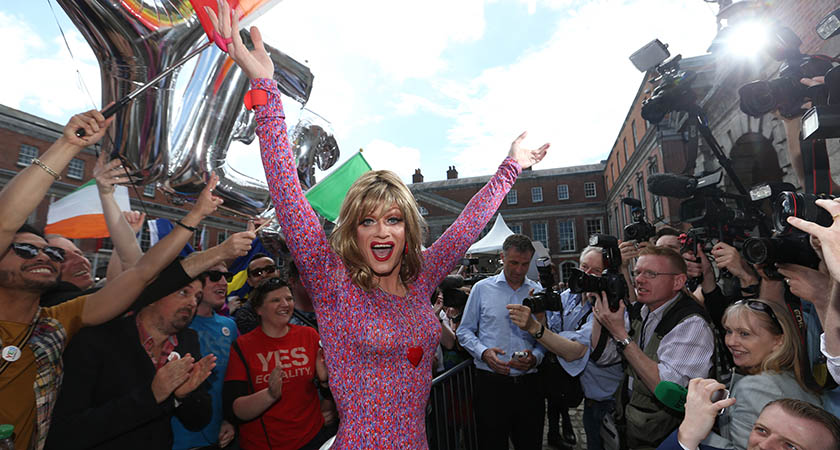IMAGINE Ireland and the North involved in a game of socially progressive poker. Well, this week saw Northern Ireland’s newly appointed Sinn Fein Health Minister Michelle O’Neil see the South’s gay marriage and raise her by lifting a ban on gay men donating blood across the six counties.
Gay marriage remains illegal in the North, while same-sex couples in the rest of Britain and the Republic of Ireland can marry; that right most recently achieved in Ireland, following last May’s referendum.
Yet, in Ireland a complete ban on gay men giving blood remains firmly in place since the 1980s at the height of the AIDS epidemic.
To this day I have a vivid memory of the first and only time I have donated blood in my life, not because I was scared at the prospect of having a needle jabbed into my arm literally sucking the life out of me, but mostly because of who I am.
It was 2002 and I was a 19-year old gay man who hadn’t had sex with another man, but I was fully aware that there was a ban on my kind giving blood. Because I was still was a virgin I knew I could donate without breaking the rules.
I also wanted to be able to go along with my two other straight friends and do the same as them, be part of the altruistic gang, (I have vague memories of a very prominent public awareness campaign running at the time that was clearly working on me) but yet despite the fact that I was able to tick all the safety boxes in the right place I was consumed with a feeling that I was doing something wrong. Would the nurse find me out, somehow? Maybe that encounter with that guy could be considered a sex and I was actually breaking the rules? And humming in the back of my mind was that what all this really meant was I’m was destined to end up with AIDS and an early death sentence if ever had sex with a man. I know, daft, but that was 14 years ago, times have changed, but yet for all the progress we’ve made this regressive ban remains brazenly in place.
The Irish Blood Transfusion Service (IBTS) got my pint of haema and off I went, but I haven’t been allowed to donate ever since. In Britain, where I now live, the ban was lifted in 2011 but replaced with a 12-month exclusion. Basically, you can’t have sex with another man for a year before donating blood. Campaigns like Freedom to Donate is currently lobbying the British Government for a review of the year-long deferral, following advancements in detection techniques.
But until the NHS Blood and Transplant service can test every blood donation with 100 per cent accuracy during the so called ‘window’ period where some viruses, including HIV, don’t show up immediately, it’s unlikely the deferral period will be abolished anytime soon, and some would argue for good reason.
Men who have sex with men (MSM) remain the most at risk to HIV infections. Public Health England (PHE) recorded 6364 new HIV diagnoses in 2012 with almost two thirds found to be in MSM within Britain and Northern Ireland.
In contrast Ireland’s blood donation policy remains terribly regressive. The qualifying criteria currently focuses on the sexual orientation of an individual and not their sexual practices, banning men who have never had sex with other men, and regardless of the frequency or length of time since intercourse.
The IBTS has said it is currently reviewing its position on the matter and is expected to present a report to the Irish Government’s Department of Health by the end of June. It is expected to recommend a reduction of the ban from life to five years. Progress, but still a conservative development at best.
Currently three percent of the Irish population give blood while 3,000 blood donors are needed each week in Ireland. One in four people will need a blood transfusion at some point in their lives and over 1,000 Irish people receive transfusions every week. With these kind of figures banning a whole section of society is short sighted and harks back to a time when homosexuals in Ireland were treated like lepers. Time for Ireland to give up that snake eyes act and join the rest of Britain and Northern Ireland by not shaming but saving lives instead.
Gay marriage remains illegal in the North, while same-sex couples in the rest of Britain and the Republic of Ireland can marry; that right most recently achieved in Ireland, following last May’s referendum.
Yet, in Ireland a complete ban on gay men giving blood remains firmly in place since the 1980s at the height of the AIDS epidemic.
Currently three percent of the Irish population give blood while 3,000 blood donors are needed each week in Ireland. One in four people will need a blood transfusion at some point in their lives and over 1,000 Irish people receive transfusions every week. With these kind of figures banning a whole section of society is short-sighted and harks back to a time when homosexuals in Ireland were treated like lepers. Time for Ireland to give up that snake eyes act and join the rest of Britain and Northern Ireland by not shaming but saving lives instead.
Got a story for us? Contact us here, on Facebook, Twitter or email [email protected]


